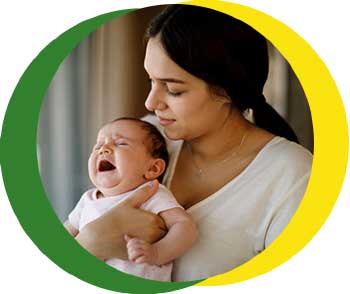My baby is crying all the time

Babies cry for many reasons – most commonly because they are hungry or need a nappy change. Sometimes babies cry because they are uncomfortable or are unwell. This may be due to colic, reflux, constipation or infection amongst other things (see below).
ICON
ICON is all about helping people who care for babies to cope with crying. It stands for:
- I – Infant crying is normal
- C – Comforting methods can help
- O – It’s OK to walk away
- N – Never, ever shake a baby
Sometimes the crying can feel like it’s becoming too much, and if this is the case, find out more advice on what you can do and you can try these simple comfort methods to see if the baby stops crying.
Below are some things to look out for if your baby is crying that may suggest they are unwell.
When should you worry?
If your child has any of the following:
- Becomes pale, mottled or abnormally cold to touch
- Becomes stiff for a prolonged period or has rhythmic, jerky movements of arms or legs that does not stop when you touch it (a fit/seizure)
- Becomes extremely agitated (crying inconsolably despite distraction)
- Becomes floppy or very lethargic (difficult to wake)
- Is going blue around the lips
- Has difficulty breathing
- Is under 3 months of age with a temperature of 38°C / 100.4°F or above (unless fever in the 48 hours following vaccinations and no other red or amber features)
- A rash that does not disappear with pressure (see the “Glass Test“)
You need urgent help
Go to the nearest Hospital Emergency (A&E) Department or phone 999
If your child has any of the following:
- Is 3-6 months of age with a temperature of 39°C / 102.2°F or above (but fever is common in babies up to 2 days after they receive vaccinations)
- Continues to have a fever of 38.0°C / 100.4°F or more for more than 5 days
- Becoming increasingly sleepy and not consistently waking for feeds
- No wet nappies in the last 8 hours
- Has a dry mouth or sunken fontanelle (soft spot on the head)
- Is getting worse or you are worried
You need to contact a doctor or nurse today
Please ring your GP surgery or call NHS 111 – dial 111
We recognise that during the current COVID-19 crisis, at peak times, access to a health care professional may be delayed. If symptoms persist for 4 hours or more and you have not been able to speak to either a member of staff from your GP practice or to NHS 111 staff, then consider taking them to your nearest ED
- None of the above features are present
- Continues to feed well
- Has plenty of wet nappies
- Try to make sure that your baby stays well hydrated – you may need to offer them feeds more frequently than normal. And closely monitor them for any signs of deterioration by looking out for any red or amber features.
- Additional advice is also available for families to help cope with crying in otherwise well babies
Self care
Continue providing your child’s care at home. If you are still concerned about your child contact your Health Visitor or call NHS 111 – dial 111
Conditions that can cause a baby to cry excessively:
Reflux
Infection
Colic
Constipation
Where should you seek help?
- If it is non-urgent, speak to your local pharmacist or health visitor.
- If your child has any of the above features, urgently see your GP. For an urgent out-of-hours GP appointment, call NHS 111.
- You should only call 999 or go your nearest A&E department in critical or life threatening situations

